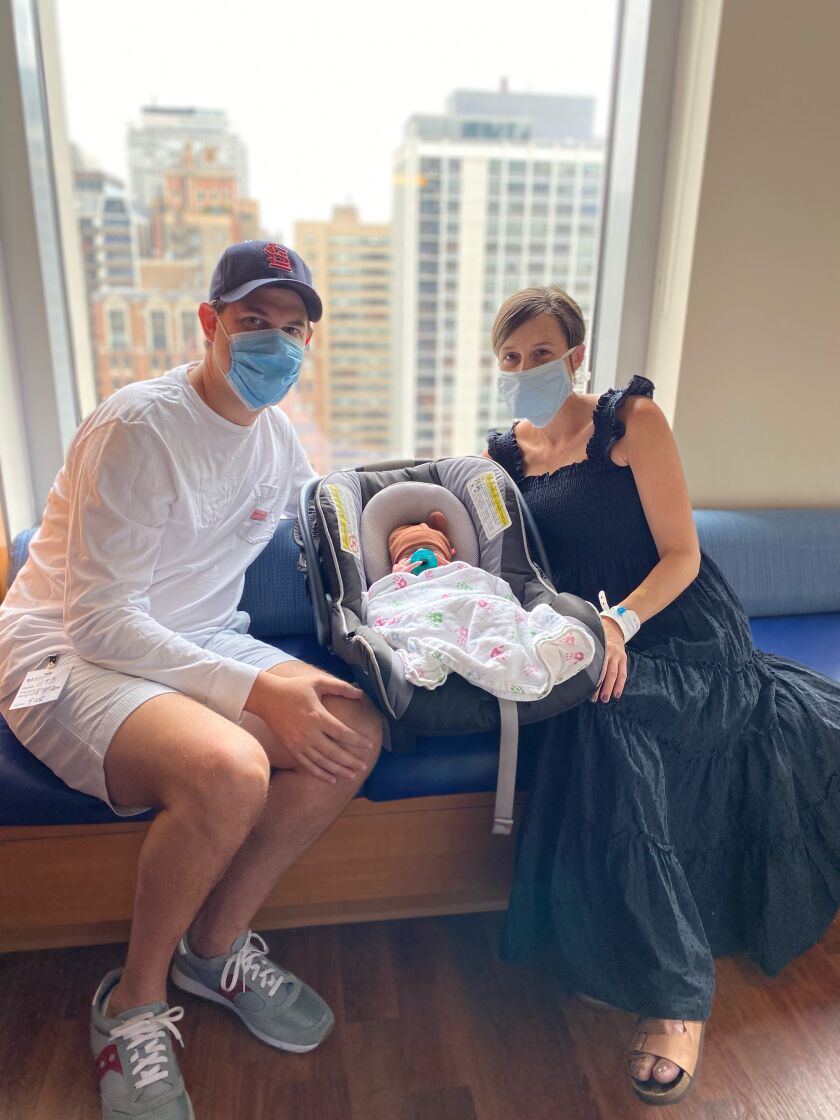Nea Gates never planned to get vaccinated.
Even six months into her pregnancy and despite her OB-GYN at the Rush University Medical Group consistently urging her to do so, Gates remained skeptical, feeling the making of the vaccine was “rushed,” the 37-year-old South Loop resident said.
Seeing continual reports and articles about pregnant women having severe and sometimes deadly cases of COVID-19, Gates had a change of heart. By the end of October, Gates plans to be fully vaccinated, well before her Dec. 18 due date.
“I recommend people do get the vaccine,” said Gates, who received her first dose Oct. 6 and is scheduled to get her second dose later this month. “Especially if you’re pregnant, you have to think about not just yourself but also the unborn child you’re carrying.”
Two-thirds of pregnant women are not fully vaccinated, despite the fact they have a higher risk of severe illness from COVID-19, according to a recent report from the Centers for Disease Control and Prevention. Just 18% of Black pregnant women, 29% of Latino pregnant women and 36% of white pregnant women are fully vaccinated. That’s compared to the 68% of U.S. adults who are fully vaccinated.
The CDC now “strongly recommends” vaccines before or during pregnancy, and many Chicago health professionals are doubling down on efforts urging pregnant women to do so.
“Your immune system is blunted in pregnancy,” said Dr. Edward Linn, former chair of the OB-GYN department at Rush University Medical Center. “We need to avoid this, and we know vaccines work.”
Pregnant women don’t contract the virus at higher rates than those who are not pregnant, Linn said. But when infected, the virus can be far more dangerous to both the mother and the unborn baby, he said. Complications include premature birth, preeclampsia and death of the mom, baby or both, said Linn, who is also co-chair of the Chicago Medical Society’s COVID-19 Task Force.
Misinformation about negative vaccine effects on pregnancy have been widely circulated, especially on social media. That’s due in part to fear originating from the fact that women who knew they were pregnant were excluded from the original vaccine trials.
But as it turns out several women in the original study were pregnant at the time they were vaccinated and didn’t know it — and those women experienced no pregnancy problems, Linn said. Additional studies have affirmed that finding.
And there is “nothing showing scientifically to date that” the vaccine has any relation to infertility, Linn said.
Rachel Geeser is all too familiar with infertility. Before the pandemic, Geeser, 36, of Lake View, and her husband were gearing up for their fourth round of in vitro fertilization treatment.
During the pandemic, Geeser and her husband got pregnant on their own, she said. Once eligible for the vaccine, Geeser was about 10 weeks pregnant and took the first open vaccine appointment she could find, even though it required driving to the suburbs. In September, Geeser gave birth to a “perfectly healthy” baby boy.
“I feel some sense of comfort that he has the antibodies,” Geeser said — something her older daughter, who is 3, doesn’t have since a vaccine for children under 12 has not been approved by the FDA. “I was able to protect him in that way.”
Indeed, vaccination allows antibodies to pass to the baby through the placenta, helping protect them even after they are born, said Dr. Leena B. Mithal, a pediatric infectious disease specialist at Lurie Children’s Hospital and an assistant professor at Northwestern University’s Feinberg School of Medicine.
Mithal led a study in April that revealed getting vaccinated early on in pregnancy leads to a better transfer of antibodies to the baby. Other research has shown antibodies can also be transferred through breast milk when feeding, Mithal said.
Women who get vaccinated while pregnant can feel confident they are taking “every measure to prevent infection,” Mithal said.
“The pandemic is not over — it’s far from over,” Mithal said. “As a physician, as a scientist and as a mother, I think one of the best things that you can do to protect yourself, your pregnancy and your developing baby is to make sure you have vaccine protection.”
Chicago health care worker Pamela Simone was among the earliest vaccine recipients, getting her first dose in December. Simone, 33, of Oak Park, was 11 weeks pregnant and was “all for” getting the vaccine as soon as she was eligible, she said.
Simone also registered for v-safe through the CDC, a smartphone tool that provides health check-ins after receiving the vaccine. She encourages other pregnant women who get vaccinated to do the same to help build robust data that the vaccine is safe.
“The statistics are glaring that having COVID when pregnant can be really devastating,” Simone said. “That risk compared to very minimal risk the vaccine would do something to my unborn child, it was a no-brainer decision.”






